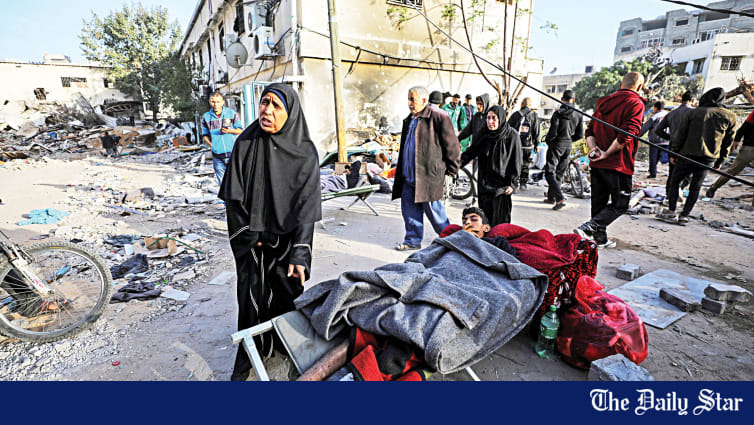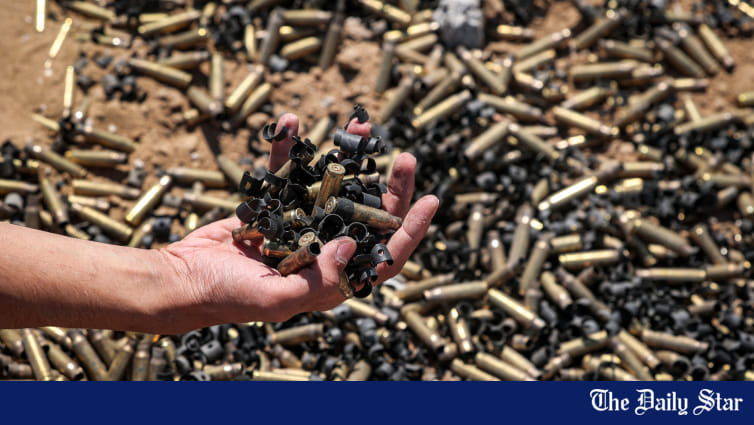Saif
Senior Member
- Messages
- 17,408
- Likes
- 8,373
- Nation

- Residence

- Axis Group


Gaza children fly kites to escape horrors of offensive
Metres away from the concrete and steel fence separating the Gaza Strip from Egypt, 11-year-old Malak Ayad flies a paper kite high in the sky -- a welcome distraction from the horrors of Israeli offensive.
Gaza children fly kites to escape horrors of offensive

Members of a Palestinian family leave Rafah in the southern Gaza Strip with personal belongings yesterday. The United States has warned Israel against expanding its military operation into Rafah, where over a million Palestinians are sheltering, without a plan to protect civilians. Photo: AFP
Metres away from the concrete and steel fence separating the Gaza Strip from Egypt, 11-year-old Malak Ayad flies a paper kite high in the sky -- a welcome distraction from the horrors of Israeli offensive.
"Every day I play with my brothers and cousins with kites next to the Egyptian border," said the Palestinian girl, displaced from Gaza City with her family to the southern city of Rafah.
"When I do, I feel free and safe," she added, gently manoeuvring her kite, which she calls "Butterfly", back and forth across the border with a white string.
Her cousins and friends run along the fence trying, in vain, to get their kites to take flight, but a loud explosion in the distance makes them stop in their tracks.
"Quickly, the (Israeli) bombardment is getting closer," said Malak's uncle Mohammed Ayad, 24, urging the children to leave the area.
Malak quickly obeys, reeling in her kite and folding it, then rushes back to a tent where her family is taking shelter in the nearby Khir area.
"Playtime is over. When air strikes begin we run back home," Malak said, trembling with fear.
Israel's campaign to destroy Hamas has killed at least 32,782 people, mostly women and children, according to the Gaza health ministry.
Malak Ayad and her family are among 1.5 million people, most of them displaced by the offensive, now living in Rafah, where Israel has vowed to carry a ground offensive as it pursues its campaign against Hamas.
Despite the offensive and the fear that grips her, Malak seems to be happy to fly her kite and dreams of life as it was before the offensive broke out on October 7.
"My kite flies to Egypt everyday while we are here trapped in Gaza," said Malak, who wears a bracelet featuring the Palestinian flag.
"I don't know when we will be able to return home," she said, adding that her mother told her that her school has been hit by the Israeli army and "destroyed".
Members of a Palestinian family leave Rafah in the southern Gaza Strip with personal belongings yesterday. The United States has warned Israel against expanding its military operation into Rafah, where over a million Palestinians are sheltering, without a plan to protect civilians. Photo: AFP
Metres away from the concrete and steel fence separating the Gaza Strip from Egypt, 11-year-old Malak Ayad flies a paper kite high in the sky -- a welcome distraction from the horrors of Israeli offensive.
"Every day I play with my brothers and cousins with kites next to the Egyptian border," said the Palestinian girl, displaced from Gaza City with her family to the southern city of Rafah.
"When I do, I feel free and safe," she added, gently manoeuvring her kite, which she calls "Butterfly", back and forth across the border with a white string.
Her cousins and friends run along the fence trying, in vain, to get their kites to take flight, but a loud explosion in the distance makes them stop in their tracks.
"Quickly, the (Israeli) bombardment is getting closer," said Malak's uncle Mohammed Ayad, 24, urging the children to leave the area.
Malak quickly obeys, reeling in her kite and folding it, then rushes back to a tent where her family is taking shelter in the nearby Khir area.
"Playtime is over. When air strikes begin we run back home," Malak said, trembling with fear.
Israel's campaign to destroy Hamas has killed at least 32,782 people, mostly women and children, according to the Gaza health ministry.
Malak Ayad and her family are among 1.5 million people, most of them displaced by the offensive, now living in Rafah, where Israel has vowed to carry a ground offensive as it pursues its campaign against Hamas.
Despite the offensive and the fear that grips her, Malak seems to be happy to fly her kite and dreams of life as it was before the offensive broke out on October 7.
"My kite flies to Egypt everyday while we are here trapped in Gaza," said Malak, who wears a bracelet featuring the Palestinian flag.
"I don't know when we will be able to return home," she said, adding that her mother told her that her school has been hit by the Israeli army and "destroyed".









